In The Community
Our Employees Making the Difference
At Lockheed Martin volunteering is part of our DNA, whether this is through the outreach opportunities we provide to staff or the inspiring work of our employees volunteering for organisations close to their hearts on top of their day jobs. In 2019, 7,084 employees across the corporation worldwide volunteered, totalling an incredible 500,000 hours.
Meet Deborah, Kevin, Laura, Jessica -- just a small sample of all the many stories our employees have.
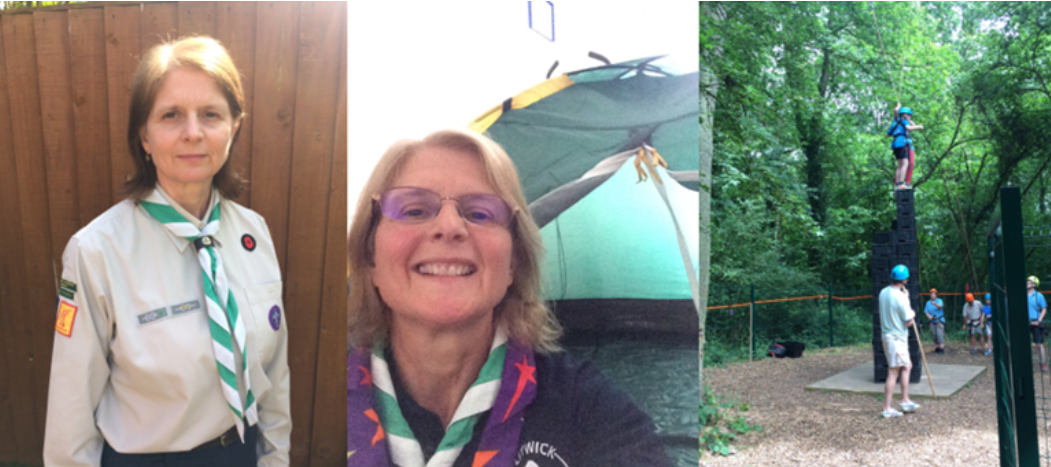
"I am a volunteer Cub Scout Leader at my local Scout group. We were planning to have an entire weekend in April this year for Cub Camp but due to COVID-19 restrictions we had to make many changes. We held bases for eight cubs at a time so we could maintain social distancing, and although we could not go canoeing, we were still able to maintain a sense of normality with other activities, such as; Archery, Backwoods Cooking and Air Rifle Target Shooting. Despite the rain, we had a wonderful Activity Day for our 48 Cubs! There were many other volunteers who helped us with putting up shelters, arranging resources for the activities and cleaning the toilets! Below, is a thank you note we received last week from a parent of a Cub who attended the Activity Day. I think this says enough about why I volunteer;
‘Thank you for today. This was about becoming more normal, he has lived the life of a child of a key worker. Every day I had to send a picture to his teacher of me proving I was still alive. Every day he would go to school thinking he wouldn’t see me again. Cubs has been a lifeline for him.’"
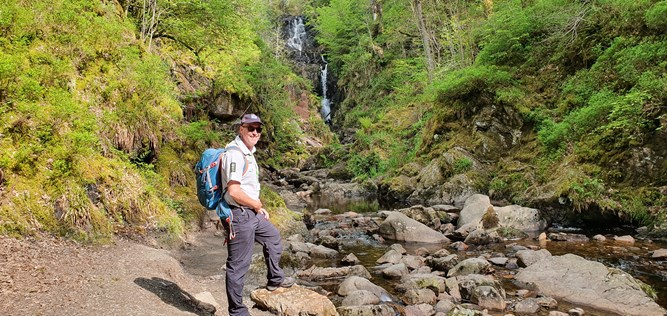
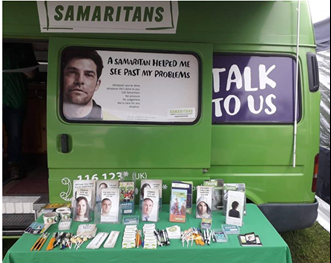
"I have been part of the Samaritan organisation since September 2016 when I started my training. I am a listening volunteer and part of the Outreach Team. As a listening volunteer I do a weekly shift where I take calls from those who are going through a challenging time. This is such a fulfilling role as we have the opportunity to really be there for someone in their time of need. I have learnt so much about what it means to actually listen to someone and have implemented these skill in my day to day life. Being part of the Outreach Team allows me to get out into our community to offer information about Samaritans, deliver talks on active listening and share our vision of masking sure people know “there’s someone there for anyone who needs someone”. I have had the added bonus of meeting my partner, Robin, while volunteering who is also a Samaritan’s listening volunteer and the Regional Training Officer for the South West. Thankfully this means he is very understanding about all the volunteering that I do."
You can find out more about volunteering at Samaritans here.
Anyone seeking emotional support from Samaritans can call the Free Phone number 116 123 or email.
Jessica Piper, Marketing and Communications Intern at Ampthill
"During the pandemic I started helping my grandparents and elderly neighbours when they were in isolation. This then encouraged me to join the NHS Community Responder Team! I joined the team early February and have been helping out on my free days during the weekends. We do small but significant things for those who are still shielding or are not yet comfortable with going out– things like food shopping, collecting prescriptions and the most popular request; a chat over the phone. It is really hard to hear how lonely the elderly generation has been during the lockdown, so I am very grateful for being a part of a team who are helping out!"
Inspiring the Next Generation
We believe that our future success and ability to engineer a better tomorrow depends on a constant supply of highly trained, highly capable technical talent.
Our partnerships in STEM education in the UK help us inspire the next generation of engineers, technicians and even astronauts. Across the country, we are working to promote Science, Technology, Engineering and Maths through engaging opportunities with young people – concentrating on space exploration, aviation, engineering and cyber-skills.
Royal International Air Tattoo
For a number of years, we’ve been proud sponsors of the Royal International Air Tattoo’s Techno Zone, bringing STEM subjects to life and inspiring the next generation. Our exhibits in 2019 send children on a mission to learn more about some of the amazing things Lockheed Martin is doing in the air and in space. This includes bringing to life the F-35 and our involvement in NASA’s Mars missions for a younger audience, with an immersive experience that excites, inspires and educates.
We also sponsor the Schools Engineering Challenge, a STEM-focused activity which involves students designing and building an aerodynamic vehicle which can trigger a system to fire a weight over the greatest distance. This runs throughout the year with the finals held in July at the Tattoo.
Code Quest
Code Quest has been developed to challenge and inspire students as part of our focus on STEM subjects. On one day of the year, students around the world work in small teams at Lockheed Martin sites to solve a set of coding challenges developed by our information technology professionals.
In the UK, at our Whiteley site, a team from Havant & South Downs College and Churcher’s College won in the advanced and novice categories in our competition held in Whiteley, Hampshire and a team from Samuel Whitbread Academy in Bedford won the competition held in Ampthill.
Click here to see how teams from across the US and beyond got on in 2019.
Women in STEM
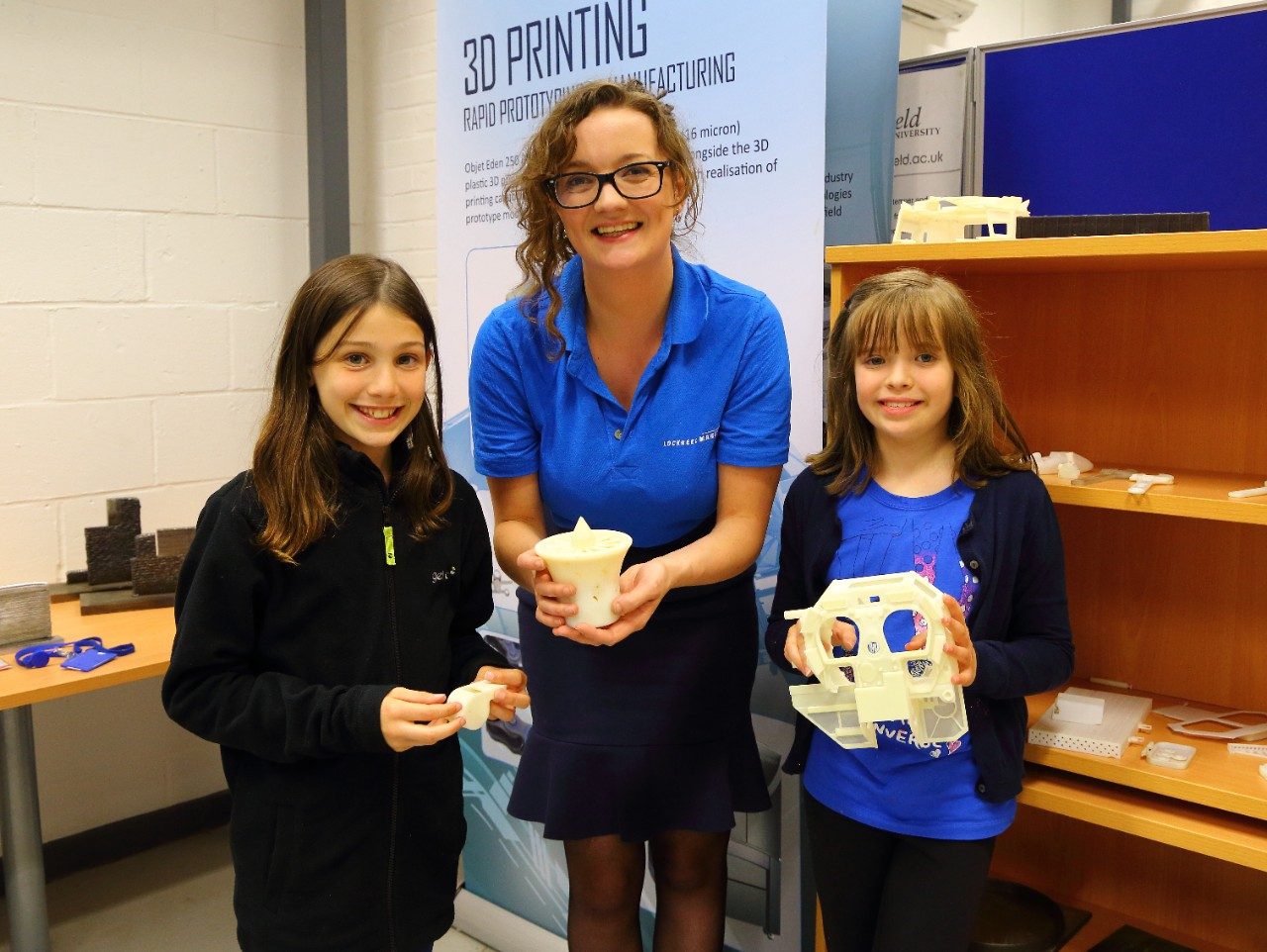
EMMA RYAN, research engineer and doctoral student, works in wire arc additive manufacturing, (WAAM) – a sort of 3D printing meets welding.
“I research materials by looking at them using electrons and x-rays and making sure they’re good quality so that we can 3D print spaceships, satellites and armoured fighting vehicles.”
“After graduating with a physics degree I turned to engineering. It’s physics applied to real life, somewhere I can build things that have a real, tangible effect on the world. I’ve always wanted to build spaceships and my engineering doctorate gives me the expertise and knowledge to do that. Every choice I make is a step closer to something in space bearing my name.”
“I love my job, whether I’m manufacturing five foot steel cones using a technique no one’s ever tried before, breaking parts so I can test how strong they are, or measuring 40 different points on a bit of wire to see if there’s any variation in diameter. (Okay, maybe not that last one so much.) I love that I research a new and exciting technology, full of big ideas and right at the forefront of industry.”
“I’ve been told on numerous occasions that I don’t look like an engineer. Engineering is a noticeably male-dominated industry and the only way for this to change is for there to be more of us. It’s important for women to realise they can be engineers if they want to be engineers. Diversity in the workplace can only be a good thing, with different people viewing a problem in a different way to arrive at an effective solution.”
“To overcome the lack of women in engineering we need to inspire girls from a young age. I was very lucky to have wonderful role models at school. Four teachers in particular encouraged my love of learning and motivated me to pursue a career I enjoy. All four were women and they all taught STEM subjects, so it never occurred to me that women couldn’t or shouldn’t do STEM. We need to raise awareness of the vast range of STEM jobs there are out there, to show girls that engineering is for anyone who wants to make a difference, regardless of their gender.”
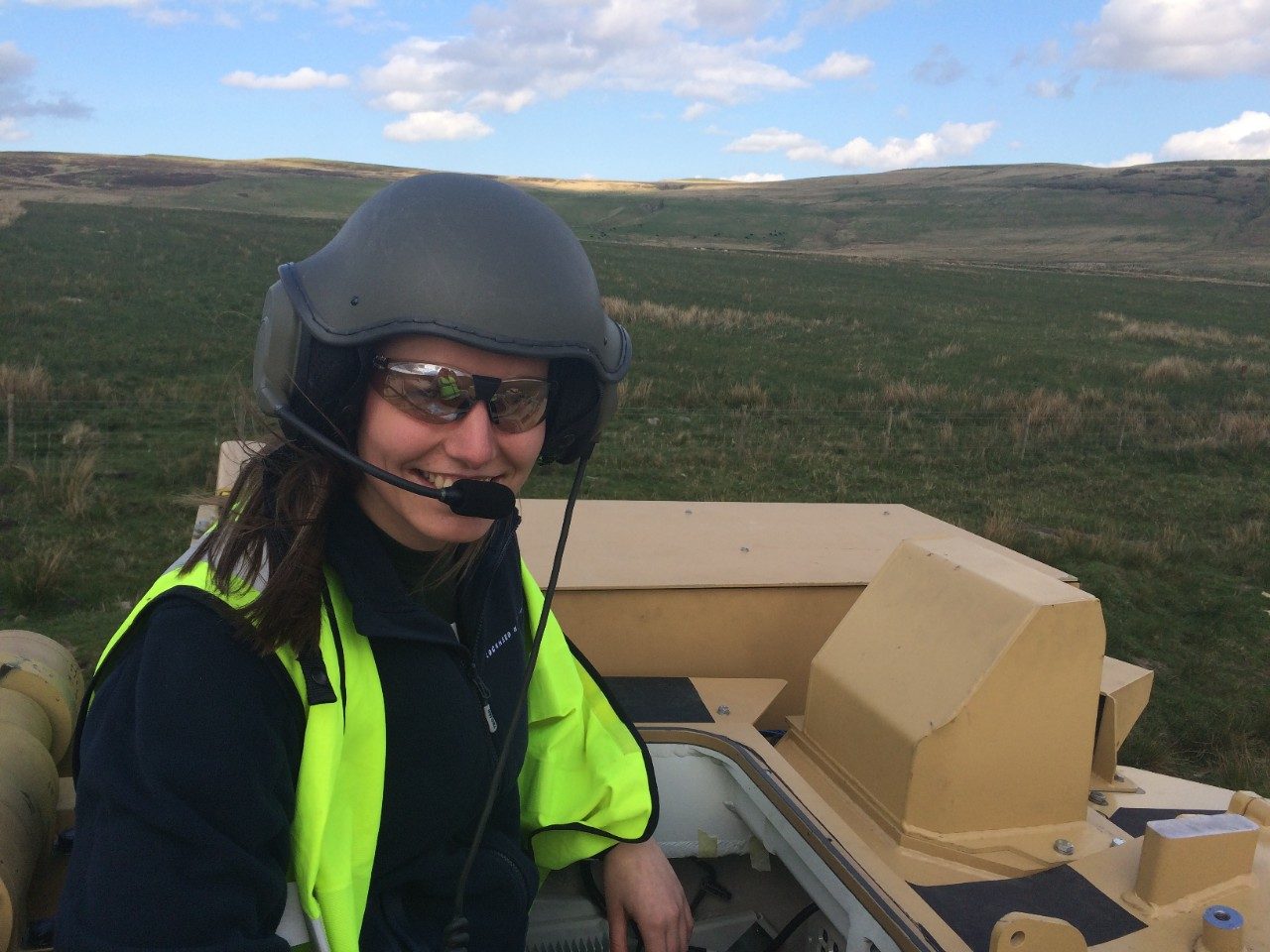
EMMA DOOTSON, integration and test and survivability engineer, works on the Warrior Capability Sustainment Programme and the LMUK export turret.
“My job includes live firing of various ammunition types into the Warrior armour, to make sure the crew inside are as safe as they can be when they come under fire from enemies.”
“I’ve always been fascinated by logic, science, and fundamentally how things work. I chose to study a masters in physics to gain a good all-round understanding. During my third year of study I did an internship with LMUK in Ampthill and knew instantly that this was the industry I wanted to be in. I applied to be a graduate and have never looked back!"
“Engineering allows me to apply the physics from my degree to real-life products. It is uniquely satisfying to look at something working as it should and knowing you had input into its design. I love the variety in my job – one day I’ll be in scruffs with a spanner in my hand and the next presenting in a conference room. I’ve also had incredible opportunities, including performing ballistic tests, driving armoured vehicles, and training to use a cannon that isn’t even in service yet."
“I have received some comments, such as ‘do you need some help with that? It’s heavy for a girl’ and genuine surprise at some of the things I’m trained to do – ‘you know how to use a crane?!’ – but I honestly enjoy breaking the stereotypes. When someone doubts you, the best thing to do is prove them wrong. On a lighter note, a more common challenge can be deciding what to wear. I’ve been on top of a vehicle in a dress and safety boots before!"
“It’s important that engineering is not overlooked by someone just because they’re female. My advice would be that if you’re even a tiny bit curious, look into it – I can guarantee that there is something under the umbrella of engineering that will excite you. It covers such a vast range of careers, from software to spanners, design to drilling, and everything in between. By working with schools and showing young girls how far STEM subjects can take them, we can hopefully encourage more women to enter engineering.”
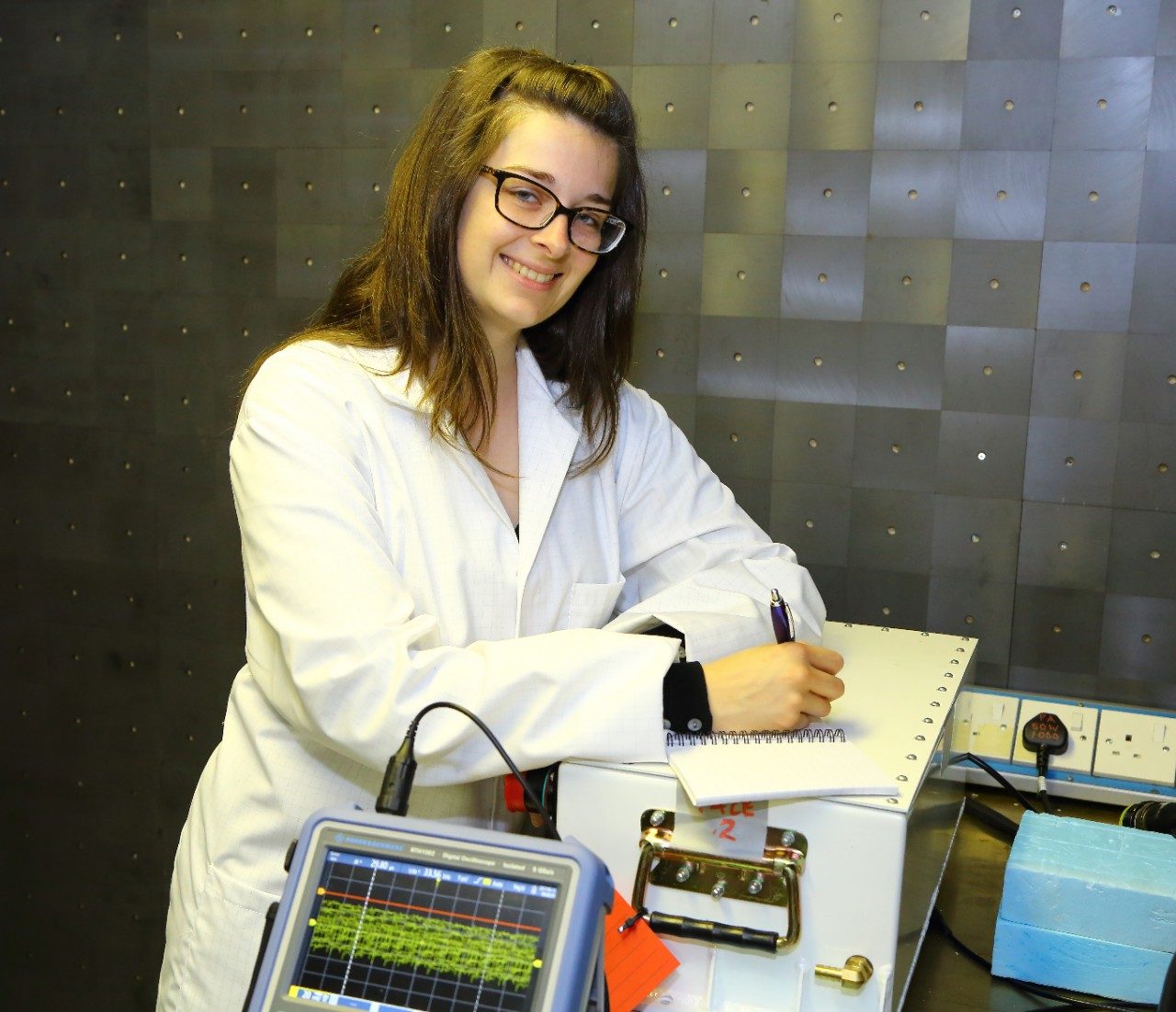
KATE DEAN, Electromagnetic Compatibility (EMC) systems engineer, works on the Lockheed Martin UK turret for the British Army’s AJAX vehicle.
“Electricity can leak into or out of the turret, and I help make sure that doesn’t happen – rogue electricity can cause equipment to malfunction or break down.”
“My interest in engineering started when I was a child and my dad used to get me little electronic kits that we could build together. During my A levels I was part of the college robotics team and absolutely loved it. The hands-on design, manufacturing and testing was so interesting. I wanted to go to university to become an engineer but I really struggled with my A levels and left with two Cs and an E.”
“I was accepted onto an aircraft engineering foundation course, which is a great entry level option for people who don’t quite get the grades they want. I had a fantastic time and found a real love for engineering, going on to complete my BSc, graduating with first class honours having won student of the year three times. Just goes to show what you can do if you find something that really inspires you!”
“There were certain moments during my degree when fellow students were perhaps overlooking the contribution I was capable of making, or not giving my ideas proper consideration. They weren’t used to taking advice from or listening to women. It’s important we keep breaking down stereotypes so that girls can pursue what they want to do without fear of how they may be received. Yes, you may end up being one of only a few women – or even the only one – but it really doesn’t matter. If you work hard people will notice you and respect you, regardless of your gender.”
“I’d love to see engineering become a more normal concept for women and girls so that there are more of us. It’s important to celebrate women engineers in order to encourage more to give it a try – the earlier girls are encouraged to give STEM subjects a go the better, as it will become less of an alien idea to them. It will help stop the distinction between ‘male engineer’ and ‘female engineer’ – we’re all just engineers. It’s a great job, loads of fun and really interesting, and I’d encourage anyone to go for it.”
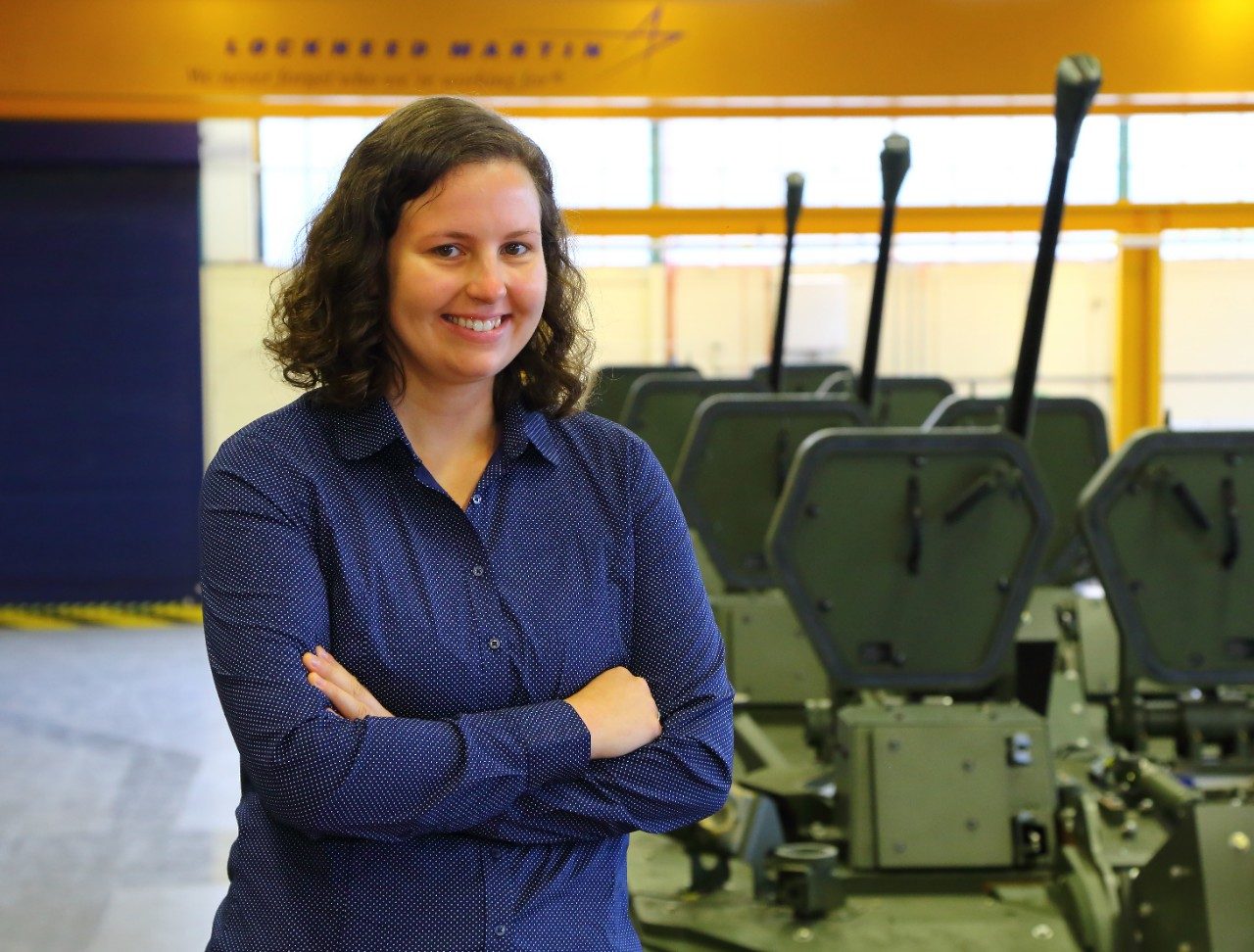
NICKY BARRATT, fightability systems lead, works on the Warrior Capability Sustainment Programme.
“I make sure the soldiers can ‘fight’ their vehicle. I’m responsible for the system design that allows the crew to interact with and control the vehicle’s systems effectively.”
“I took a fairly conventional route into engineering, taking STEM subjects at A level and then studying for an aeronautical engineering degree. I’ve always had a curiosity for how things work but it was my time with the RAF cadets that really drew me into engineering. Learning to fly and being taught the aerodynamic principles really sparked an interest for me."
“Being an engineer I get to see first-hand the results of something I’ve been involved in become reality. It’s very satisfying. The safety criticality of my work on the Warrior programme makes it very rewarding – I have a lot of contact with the soldiers and it helps put the importance of what I’m doing into context."
“I’ve never experienced any real obstacles during my career due to being female. Some people have been surprised when I tell them I’m an engineer and sometimes I’m the only woman in a meeting, but on the upside that means I’m often remembered! At work I’m first and foremost an engineer, and my gender doesn’t matter."
“My family have been a real inspiration to me. Both my grandmother and my mother have always worked in a male-dominated environment – as coach drivers – and seeing how they handled themselves made me realise that gender stereotypes shouldn’t matter and certainly shouldn’t stop you doing what you want to do."
“It’s important to emphasise from an early age that an interest in engineering is a great thing for girls. We should be encouraging all children to do what they enjoy and what they find interesting, not just what’s traditionally been considered ‘normal’. We don’t need to target women with pink-themed, soft outreach STEM work, we just need to include them. We need to show them – and their parents and teachers – the breadth of the engineering industry and the variety of opportunities that are available. Engineering is one of the most rewarding careers you can have.”
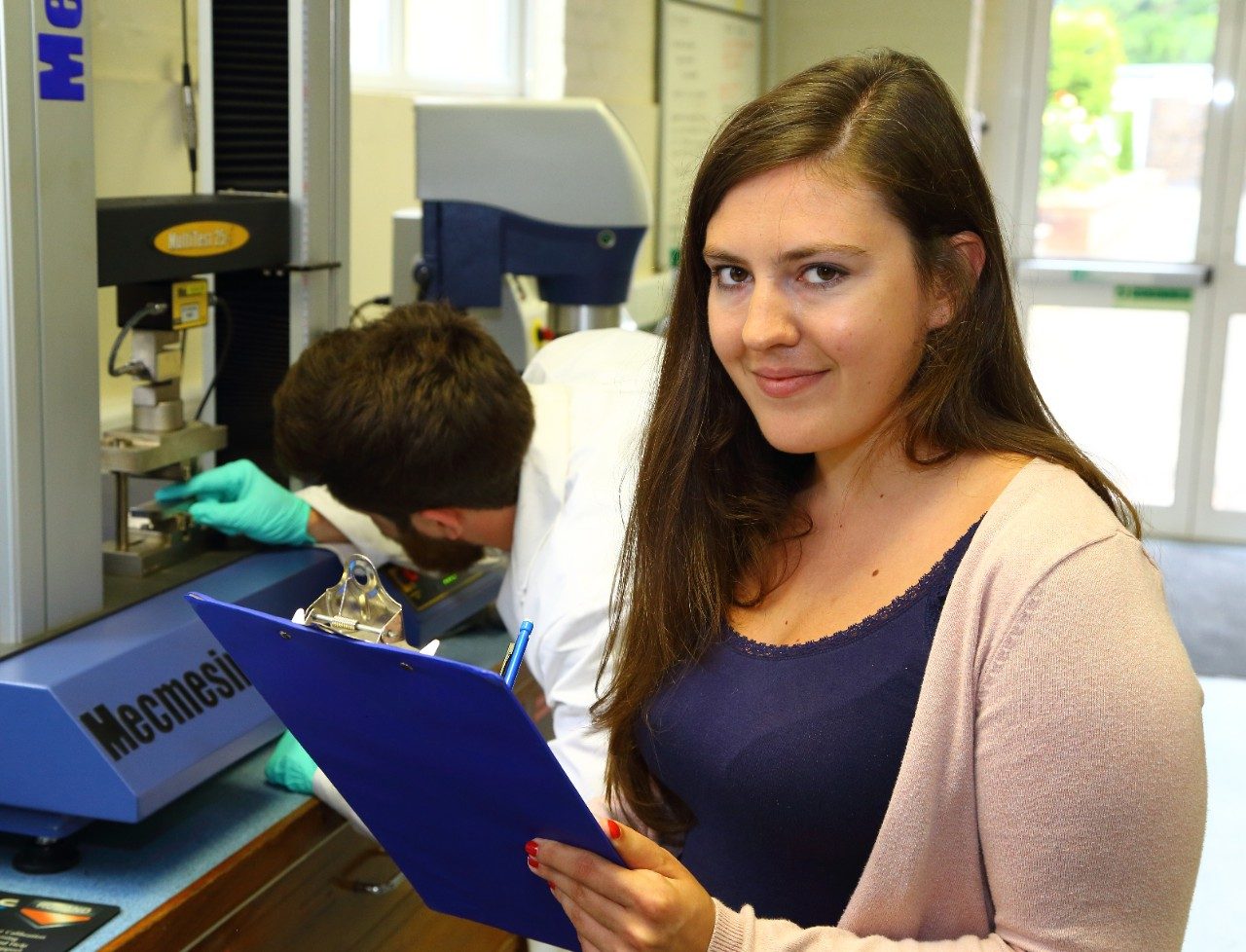
HANNAH SHEPHERD, DRACAS manager, looks after a database and helps manage a team that carries out ‘root cause analysis’ on things that have broken, bent, or just won’t work.
“I use the DRACAS – data reporting analysis and corrective action – system to calculate how reliable our vehicles are and how quickly they can be returned to operational capability should something go wrong.”
“I enjoy challenging problems. When designing or building any engineering project you need to be able to quantify the reliability of the product. To do this you need to monitor all the technical issues and their resolutions. In my work I get to live each of those paths to resolution with the different teams involved – sometimes they’re not smooth and we get to solve the problems together."
“As a female engineer I do stand out a little more, but it’s never been a hindrance. I’m continually inspired by the people around me. All the engineers that work on our projects have an enormous wealth of different knowledge and experiences and I’ve been supported and mentored by a number of those engineers who have helped me realise my own value within the organisation. More diversity in general is important, as it leads to the company having a much wider and varied knowledge base, which is obviously more effective."
“There are many reasons why women tend to shy away from certain industries and it can be hard to overcome the unconscious bias where engineering is concerned. We don’t notice we’re doing it. I enjoy challenging myself and communicating that to the young girls we work with to make sure that we don’t pass those same stereotypes onto the next generation. Everyone has different areas of skill and there is nothing ‘male’ or ‘female’ about any of them."
“I would advise anyone thinking about a career in engineering, whatever their gender, to jump in. There are so many routes to get there and so many different roles. Have a good look, see what suits you best, and go for it. Engineering needs more variation and you could really help make a difference.”
UK Youth Rocketry Challenge
We’re proud sponsors of the UK Youth Rocketry Challenge (UKRoC), organized by ADS and run annually since 2006. The challenge is aimed at students aged 11 – 18 who have to design, build and launch a model rocket with a fragile payload. The rocket must reach a set altitude with specific total flight duration and must adhere to the specific set rules. The competition’s rules and scoring parameters change each year to challenge the students’ ingenuity and encourage a fresh approach to rocket design.
The UKRoC is a great way to engage the next generation of engineers with practical experience of building and executing complex missions. North Halifax Grammar School won this year’s national finals and progressed to the international finals at the Paris Air Show in June 2019 where they were crowned international champions after they competed in an international fly-off against teams representing the USA, Japan and France.



